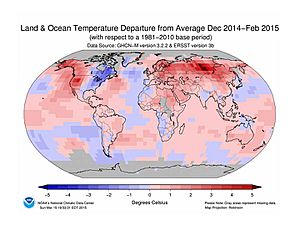National Climatic Data Center facts for kids
The National Climatic Data Center (NCDC) is the world's largest active library of weather and climate information. It is located in Asheville, North Carolina, in the United States. This important center started in late 1951. It moved into a new building in early 1952. The NCDC collects lots of information about our planet's climate change, science, and even transportation.
Contents
What is the National Climatic Data Center?
The National Climatic Data Center, or NCDC, is a very important place. Think of it as a huge digital warehouse. This warehouse stores all kinds of information about Earth's weather and climate. It's the biggest of its kind anywhere in the world.
What Kind of Data Do They Collect?
The NCDC collects many types of data. They gather information about daily temperatures. They also record how much rain or snow falls. They track big storms like hurricanes and tornadoes. Ocean data, like sea surface temperatures, is also collected. This helps us understand our planet better.
Why is This Data Important?
Collecting all this data is super important. It helps scientists understand climate change. They can see how our planet's weather is changing over time. This information also helps predict future weather patterns. Knowing what the weather might do helps people plan. It can even help keep us safe during severe weather.
How is Weather Data Collected?
The NCDC gets its data from many sources. Weather stations all over the world send in their readings. Satellites orbiting Earth also send back pictures and measurements. Ships at sea and special buoys in the ocean collect information too. All this data comes together at the NCDC.
Who Uses This Information?
Many different people and groups use the NCDC's data. Scientists use it for their research. Farmers use it to decide when to plant crops. Pilots use it to plan safe flights. Emergency services use it to prepare for storms. Even everyday people can look at this data to learn more about our climate. It helps everyone make better decisions.
 | Precious Adams |
 | Lauren Anderson |
 | Janet Collins |


